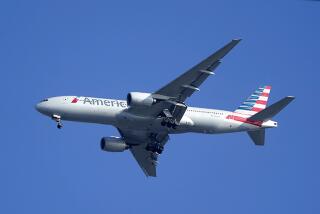Airline Industry Offers Voluntary Plan to Address Passenger Gripes
- Share via
WASHINGTON — Prodded by Congress and the Clinton administration, the airline industry announced a package of voluntary measures Thursday to address growing complaints from consumers about poor service.
The measures, detailed at a Capitol Hill news conference, will stave off, for the moment, congressional passage of stronger consumer protection legislation.
Gerald Greenwald, chairman of United Airlines’ parent company and head of the Air Transport Assn.’s executive committee, said the industry was deeply troubled by the “perception, maybe even a groundswell,” that the airlines don’t care about customers.
“We heard the bell ring; we have felt the whip,” he said.
As part of the plan, due to go into effect within six months, airlines would inform customers of the lowest fare available per flight, give better information about delays and offer quicker refunds.
Passengers could also hold or cancel reservations for up to 24 hours so they could shop for cheaper fares, under guidelines drawn up by the ATA, which represents 23 U.S. and five foreign carriers.
The measures in the airlines’ plan also include supporting an increase in the baggage liability limit, accommodating disabled passengers and meeting customer needs during long on-aircraft delays.
Several key congressional players, including Senate Commerce Committee Chairman John McCain (R-Ariz.) and Sens. Slade Gorton (R-Wash.) and John D. Rockefeller (D-W.Va.), gave qualified endorsements to the airlines’ plan.
But others, including Sen. Ron Wyden (D-Ore.), who co-sponsored a passenger bill of rights proposal with McCain, said it fell short. “This voluntary program consists mostly of stuff they are already required to do,” he said.
Rep. Peter DeFazio (D-Ore.), author of a House bill, said he will continue to seek mandatory measures. “The flying public has seen these promises made and then broken time and time again and won’t be fooled by the latest blast of hot air,” he said.
Transportation Department Secretary Rodney Slater said the steps, though short of what the administration sought in a plan outlined last fall, were welcomed, “but real performance will be closely monitored.”
He said the department was acting formally Thursday to double to $2,500 the minimum liability on lost, damaged or delayed baggage.
Pressure to take such steps came after much-publicized incidents during a storm last winter, when Northwest Airlines passengers were forced to sit seven or more hours on runways without food and other services. Congress held several hearings in which passengers related horror stories about their experiences with air travel.
The package was the result of several months of negotiations involving the administration, Congress and the industry. It was scheduled to be announced last week, but a news conference was called off at the last minute because of unresolved issues.
Still unsettled, McCain said, was his demand that airlines notify passengers when a plane is overbooked. He said he would also seek legislation requiring the Transportation Department inspector general to check periodically to see that the industry was complying with the measures.
Wyden said he was involved in negotiations late Wednesday night, which he said ended with the industry still balking on the overbooking issue, on making public all the fares on a flight and on issues of redeeming frequent-flier miles. “This was the airline industry asking the passengers to accept a wink and a nod,” he said.
Paul Ruden of the American Society of Travel Agents said he was concerned that the industry, by promising to give the lowest available fare over each airline’s telephone reservation system, was trying to induce customers to deal directly with airlines rather than with travel agents, who now handle 80% of ticketing.
Paul Hudson of the Aviation Consumer Action Project, a group founded by Ralph Nader, said the industry was agreeing mainly to obey existing laws, “and in return the Senate is ready to kill their already weak passenger rights legislation.”
Also on Thursday, Amtrak revealed its plan to win back the hearts of disgruntled rail passengers. It includes training and incentives for all 24,000 employees, enhanced food service options and improved on-board amenities.
Amtrak is also guaranteeing refund vouchers for future travel to any dissatisfied passenger.
More to Read
Inside the business of entertainment
The Wide Shot brings you news, analysis and insights on everything from streaming wars to production — and what it all means for the future.
You may occasionally receive promotional content from the Los Angeles Times.










